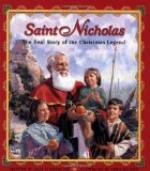It was Christmas Eve, and the great hall of the Abbey was decked with the Druids’ sacred mistletoe with its pearly fruitage, the bright green of the ivy, and branches of holly, with scarlet, shining berries. Great logs were heaped on the broad stones in the middle of the hall, and jets of flame leaped up to brighten the low, smoke-stained ceiling, and restless shadows flitted along the wall, while the smoke escaped through the opening in the roof, for chimneys were then, and for many centuries after, unknown. The unglazed windows were closed at nightfall by wooden shutters, and rude comfort cheered the inmates. A robin, who had fluttered in at dusk, and found Christmas cheer on the holly boughs and warmth for his numbed little feet, trilled a song of gratitude that winter had made such speed to be gone.
Two nights before, a company of pilgrims from the convents of Palestine, had come to the monastery. They had been many months on their way, eagerly welcomed wherever they stopped, for journeying was both difficult and dangerous, and travellers from such a remote region were rarely met. Their dark complexions, hair and beards; their bright, mobile expression; their manners toned by the graces of Eastern civilization, were a strange contrast to the shaggy, elfish, ruddy-faced throng about them. This Christmas Eve they were telling the monks wonderful stories of the Holy Land; its beautiful, vine-clad hills; its tropical, luscious fruits; its towering, plumy palms and hoary cedars; the long lines of caravans that wound over the silent, pathless deserts to bring to its cities the riches of Oriental commerce; the palaces and heathen temples of those cities, and the traditional glory of the Temple, with its magnificence of gold, and precious stones, and woods and ivory. On the table were huge platters of smoking meats, and serving men brought in flagons and tankards of ale, and feasting, stories and minstrelsy held the hours till the midnight bell called to the first mass and ushered in Christmas Day. Caedmon, coming back from the frosty chapel, saw the stars shining in the brilliance of winter skies. His heart was suffused with all he had heard the pilgrims repeat; for the first time it entered his mind that the same stars that he saw twinkling, held their course at that glad time when “the morning-stars sang together, and all the sons of God shouted for joy,”—a prelude to this other song of “the great multitude of the heavenly host.” He entered the hall, and when the company reassembled, he took his harp, and sang with power and pathos of the slumbering flocks on Judea’s upland pastures; the faithful, watching shepherds; the loneliness and silence of the night; the sudden, startling brightness that shone about them, and enveloped their angel visitant, who kindly soothed their alarm with “Fear not;” and the outburst of angelic song, unheard by the ears dulled with sleep, but overpowering these astonished men. “O happy shepherds! who alone among men, were ever privileged to hear the songs of heaven.”




